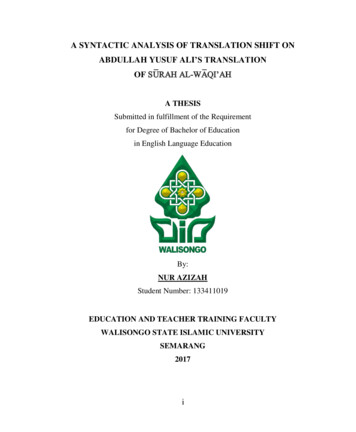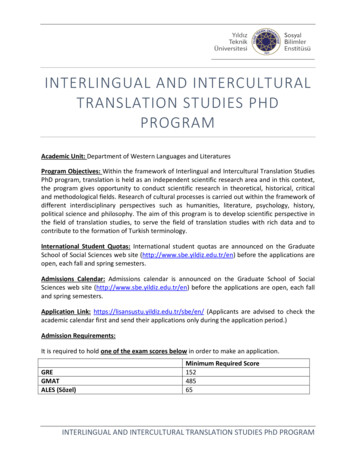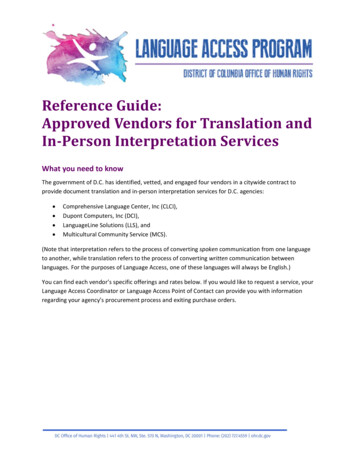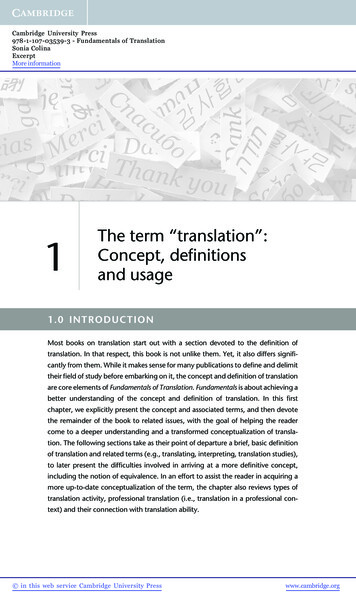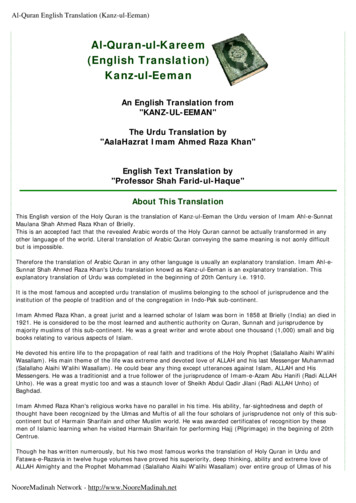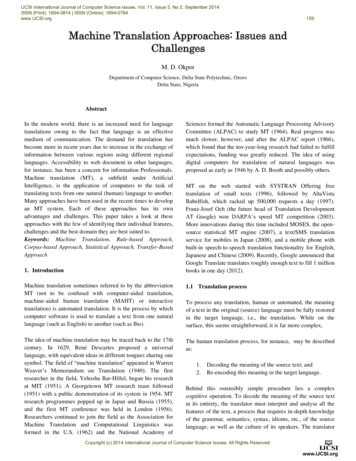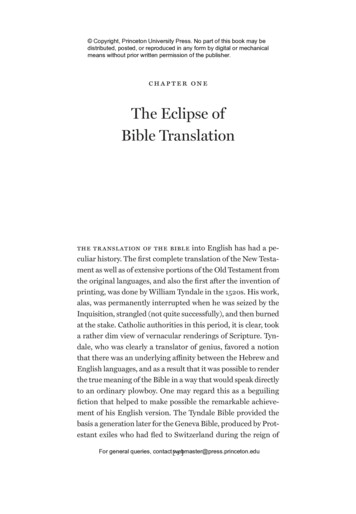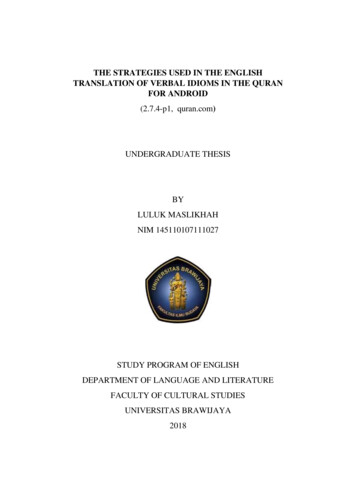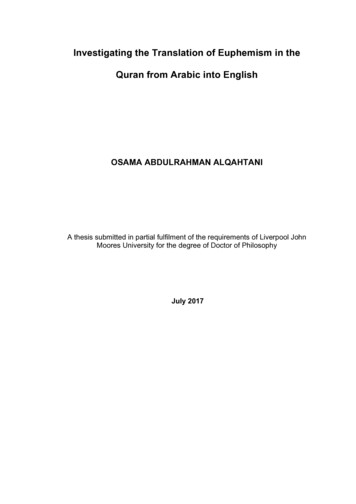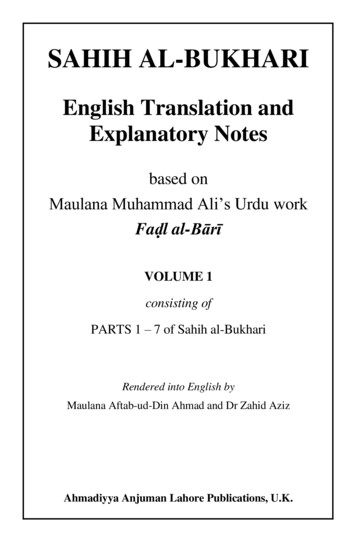
Transcription
Volume II, Issue IX, January 2015 - ISSN 2321-7065Translation of Administrative terms from English to Telugu:A Case StudySampathbabu TokalaDoctoral ScholarCentre for ALTSHumanitiesUniversity of HyderabadHyderabad – 500046Mob: 07799826118Email: tsampathbabu@gmail.comDr. Dasari KejiyaLecturer in EnglishSVKP Degree CollegeMarkapur – 523316Prakasam DistrictAndhra PradeshMob: 08142111559Email: kejiyadasari@gmail.comABSTRACTThe present paper aims to find the possibility of coining/translating Telugu terms for the existingadministrative terms. An attempt is made here to show that if we try sincerely, it is possible tocoin/translate the administrative terms with native Telugu elements.Introduction:Administrative terminology is the language in which laws and other regulations, judicial decisions,treaties and documents of all descriptions, administrative documents and treatises on law andadministration are framed. It is characterized by technical terms and by the use of words, syntax andstyle peculiar to itself. It is used by jurists and administrators in the daily exercise of their profession(Hans Schwartz, 2011). Not only that in our daily life, we can face many administrative terms whileworking and reading. This vocabulary is special vocabulary but we cannot be deviated such vocabulary inour day to day life. But these vocabularies were in English language. The Language of India relating tothe use of languages in administration, education, judiciary, legislature, mass communication, etc., ispluralistic in its scope as India is divided into 29 States and 8 Union Territories as units of administration.Originally such territorial divisions into provinces or states were done mostly for administrativeconvenience, and each state has its own language for administrative purpose.Likewise, Andhra Pradesh also has adopted Telugu as native (mother tongue) language as wellas the official language of the state. It has formed a few bodies and committees to suggest a language,343
Volume II, Issue IX, January 2015 - ISSN 2321-7065to use Telugu at all levels of administration. Most of the Telugu scholars and educated people are usingwords of other languages in their day to day life. Even though, Telugu is the official language of AndhraPradesh, in administration, it is not used at all levels. The official language chairman of Andhra Pradesh,A.B.K Prasad (2008) voiced concern over the neglect of Telugu language in day to day life and even inofficial correspondence. He underscored the need to recognize the language, so as to give the neededimpetus for its development.To implement Telugu at all levels of administration, suitable Telugu vocabulary must betranslated or coined to replace the existing English, Sanskrit and Urdu administrative terms. For thispurpose, a few glossaries need to be prepared. Hence, the government of Andhra Pradesh entrusted theduty of compiling a few glossaries of administrative terms to the Telugu Academy.The Telugu Academy has compiled and published a “Glossary of Administrative and LegalTerms” in 1980 which was revised in 2007. This glossary is very helpful but unfortunately it containsmore Sanskrit elements rather than Telugu. Instead of coining or translating with Telugu words, most ofthe administrative terms were replaced with Sanskrit words.Lapses in the glossary:It is expected to translate the existing English or Urdu administrative terms into Telugu orcoining native Telugu terms as equivalents to them. But unfortunately, the glossary is full of Sanskritterms and presented those as Telugu words. So, the people of Andhra Pradesh have to use otherlanguage i.e. Sanskrit in place of English/Urdu. Hardly, very few Telugu words are found in their glossary.Hence the term are unable to attract the local people and limited to the names of the boards and thefiles.Whereas in our neighboring state Tamil Nadu, that glossary is full of Tamil words and they areavoiding words of other languages in their administrative terms. For example in English revenue is anadministrative term and it has translated into Tamil ‘varuvAy’ in Telugu it is rendered as ‘reVvinyU’. Thereason is for this, our excessive adoration towards other languages especially Sanskrit and English. Thescholars and translators prefer to use the Sanskrit and English while replacing source language becausethey feel that they are adequate.344
Volume II, Issue IX, January 2015 - ISSN 2321-7065The arguments of the scholars in support of the Sanskrit and other languages – andanswers for them: There should be no restriction to borrow from other languages while translating administrativeterms.-It is also acceptable; there is no restriction to borrow from other terms. If it is necessary andno scope of availability of native equivalents for the source term. Barrowing must be needbased but there are many eminent scholars/translators have ability to coin/translate thesource terms into target language in Andhra Pradesh. Some are argue that Sanskrit has rich vocabulary and easy to coin terms with Sanskrit elements.Hence, it is not a taboo in using Sanskrit vocabulary by nativizing.-Anybody can agree that Sanskrit has enormous word power. But, Telugu also has richvocabulary and it is not a problem, while translating. Even we create new vocabulary, they may not be natural or effectively.-Anything which is presented for the first time will look alien or unnatural. But in due courseit may be accepted as natural and good. For example, when the term ‘Bus Stand’ is coinedas “peroMdu nilayaM” in Tamil, a few people laughed and within a short period the termwas accepted and used. Now, the term is popularly used by the Tamil people.Similarly, even if the coined term appears unnatural, in due course, it would beaccepted, without trying to popularize, we should not avoid the coining of new terms byimagining ourselves that they do not look like natural. To create technical terms in Telugu, we must use Sanskrit and Persian to make it feasible.-Through native language, we can also create terms effectively, no need to coin ortranslate with other languages.Linguists’ views and answers for them:Languages develop (rapidly) in borrowing extensively for example; English has borrowedthousands of words from other languages, including Indian languages also.Borrowing enriches a language. At the same time, unnecessary borrowing to replace the available richnative vocabulary may have detrimental effect. Hence, presages motive should be condemned. When345
Volume II, Issue IX, January 2015 - ISSN 2321-7065new concepts or objects are introduced, naturally any language has to borrow. Gradually, they coin withnative terms and replaced the borrow terms. But in Telugu, instead of coining Telugu equivalents for theEnglish and Urdu administrative terms, Sanskrit words are used with or without modifications. In thecase of English it is quite different. It is the language of the colonizers and speeded to conqueredcountries and became the medium of instruction and the language of the administration. Since it is usedby different language people as an international language, lot of foreign words are introduced.Since, geographically Andhra Pradesh situated in the central part of India, several language peoplepasses through this state and as a result the Telugu people have enormous contact with otherlanguages. Hence, Telugu tend to borrow words from other languages.The percentage of loan words in Telugu from the neighboring Indian languages is less in number whencompared to the Sanskrit loanwords. Sanskrit is never spoken by common people. So, the enormousborrowing from the Sanskrit is not because of contact with people. It is introduced in Telugu by some of thescholars through literature. All most all the earlier scholars are well versed in Sanskrit language and they havedumped the Sanskrit elements in Telugu.Hypothesis of the Study:1. If sincerely tried, it is not difficult to coin Telugu terminology for the existing administrativeterms, as Telugu has enormous vocabulary power.2. If scholars, translators, writers, Telugu administrators and even the common people are given achance to work on them, it is possible to find out native Telugu terms for any administrativeterms.3. If the government constitute few committees or boards and ask them to review the existingTelugu Translations of Telugu Academy, certainly they will trace out the lapses and suggestmeasures to translate them with Telugu terms.Selection of the Translators/Scholars:Forty members were selected from different fields like translators, scholars, and common people onbasis of following criteria: Possess of sound knowledge in both Telugu and English languages.346
Volume II, Issue IX, January 2015 - ISSN 2321-7065 Good experience in translation from Telugu and English and vice versa and knowledge in wordformation rules of Telugu. Interested in the development of Telugu language and have patience in coining native Teluguwords.Instructions given to the Translators: Translate/coin equivalent Telugu terms Do not use either the Sanskrit or the other languagewords while translating. Do not give explanation rather than equivalent term. The translation should be precise and apt, without damaging the sense of the original.Ways suggested for Identifying Telugu equivalents: Trace out the native Telugu terms, which are used by common people. For example ‘wavvoda’and ‘xoMgoda’ Telugu native words are using common people for English word ‘submarine’. If the old magazines and newspapers have coined or translated, such administrative terms inTelugu, they can be considered. With the help of dictionaries or word formation rules equivalent Telugu terms may be coined ortranslated.Methodology:A humble attempt is made here by selecting fifty administrative terms, as file and committeewhich are simple and regularly used. About 40 translators and creative writers who are well versed inboth English and Telugu are selected for this present study. A list of 50 source terms and with theirmeaning given the C.P. Brown dictionary and the equivalent terms suggest in the glossary of TeluguAcademy are given to them. In the Data sheet, the above rules are framed to translate source terms.Among them, twenty translators and scholar responded positively and translated with their knowledge.Data sheet is collect from the respondents and analyzed according to our hypothesis.Translation of Administrative terms:347
Volume II, Issue IX, January 2015 - ISSN 2321-7065Translation of administrative terminology which consists of government and non-governmentdomains related to documents and boards; are a special skill and it would be come under the area ofTechnical terms. Even the Newmark stated that “Technical translation is one part of specializedtranslation; institutional translation, the area of politics, commerce, finance, government etc, is theother” (Newmark, 1988: 151). Administrative terminology has special meanings in relation to theparticular field of study. Administrative terms translation is primarily distinguished from other forms oftranslation by terminology. However, the central difficulty in technical translation is usually the newterminology. According to sager (1990: 63) terminology is formed by a collection of terms within aparticular domain. Cabre (1999: 32) defines terminology as the principal and conceptual base thatgoverns the study of terms, the guidelines used in terminological work or its methodology as well as theset of terms of a special study and of a special topic.Translation procedures:When translating into and out of Telugu, translators are confronted with terminographical suchas a lack of equivalent terms in the target language. In addition to this, Baker (1992: 18) explains thatthe choice of a suitable equivalent does not always depend on the linguistic system or systems beinghandled. It also depends on the way both the writer of the source text and the translator of the sourcetext choose to manipulate the linguistic systems in question. As such there is there is substantial task orjob to be done in relation to language development in Telugu. According to sager (1990: 2) thatterminology is the study and the field of activity concerned with the creation, collection, description,processing and presentation of terms belonging to a specialized area of usage of one or more languages.In this regard, translation of administrative terminology work is concerned with the systematiccollection, description, processing and presentation of concepts and their designations.Analysis of the Data:The analysis of the translated terms for the given administrative terms is based on hypothesis.Each administrative term and its equivalent Telugu words suggested by the scholars and translators arelisted out in a table and are thoroughly analyzed. The words of Sanskrit origin, English and theexplanations given in place of terms are deleted from the analysis; only native Telugu terms are takeninto consideration as mentioned early.348
Volume II, Issue IX, January 2015 - ISSN s with Non-Telugu elementsTranslations with Teluguelements1. koSamu (1)1. rAbadi (4)2. reVvinyu (2)2. vaccubadi (2)3. AxAyapu paxxu (2)3. varavu (4)4. Ayawi (1)4. AxAyaM (2)5. Ayamu (2)2Security1. walArI (1)1. kApuxala (5)2. rakRanamu (2)2. kApala (3)3. baXrawa (5)4. saMrakRaNa (2)5. baXramu (2)345CommemorationAgentAgricultural Policy1. AcariMcadaM (1)1. poVgadwa (5)2. smariMcadaM (1)2. koniyAdu (3)3. jFapakArXArAXana (1)3. akkasaM (1)4. smArakowsavaM (4)4. akkasaM (1)1. prawiniXi (4)1. mAruvAdu (6)2. gumaswa (1)2. oVdayudu (3)3. paliwAnni cUpiMcevAdu (1)3. ceyuvAdu (2)4. saMxAna karwa (2)4. wAlYikudu5. saMXAnaM ceyuvAdu (1)5. wIrvari1. sexyaM pani erpAtu (5)1. pAleV erpAtu (5)2. vyavasAya vixAnaM (3)3. sexya saMbaMxa yocana (2)4. pAleV vixAnaM (2)5. vyavasAya BIma (3)6Register1. namoxu pattI (1)1. leVkkala pattI (3)2. gurwu kosaMrAse puswakaM (2)2. pattika (2)349
Volume II, Issue IX, January 2015 - ISSN 2321-7065S.AdministrativeNoTermTranslations with Non-Telugu elementsTranslations with Teluguelements3. gurwukosaMrAse poVwwamu (2)3. xina pattIka (3)4. pattI (1)5. powwamu (0)6. namoxu (4)7. perucercu pattika (2)7High Command1. muKya aXikArulu (3)2. unnawAXikAra vargaM (4)1. Analicce peVxxalaguMpu (3)3. unnawAXikArulu (2)2. pEvAru (3)4. pEvargaM (2)3. aMkeVkAdulu (2)5. axanapu BAxyawalu ceyu aXikArasaMgaM (1)8In-Charge Officer1. wAwkAlika aXikAri (2)2. mAru aXikAri (1)3. sahAyakAXikAri (7)1. mAru panigaxioVdayudu (2)2. warugari (5)3. cAlumAsi (2)4. panupari (1)9Secretary1. grAmAXikAri (1)1. pani cUpari (4)2. rAyabAri (3)2. xivAnu (1)3. kAryAXikAri (2)3. rAyasagAdu (5)4. rAwagAdu (2)5. vatara (1)6. xaMta (1)10Budget1. AxAya vyaya pattika (2)2. badjeVtu (8)1. rAbadi pobadi aMcanAkatta (7)2. aMcana (3)11Monitor1. parivekRakudu (8)1. weripAracUsexi (2)350
Volume II, Issue IX, January 2015 - ISSN 2321-7065S.AdministrativeNoTerm12Polling BoothTranslations with Non-Telugu elementsTranslations with Teluguelements2. anuSrowa (7)2. maMxaliMcevAdu (3)1. otlu vese gaxi (2)1. eVnnikala cinna gaxi2. otlu gaxi (1)3. eVnnikala nirvahana gaxi (1)(5)2. eVnnikala gadi (6)3. eVnnika ceyu gaxi (3)4. rahasya eVnikala gaxi (2)13Sample Ballot1. namUnA pawraM (2)2. maxiri pawraM (2)1. maxiri uMda (5)2. namUnA (7)3. namUnA cItI (2)4. maxiri cItlu (2)14Revenue Record1. namoxu (1)2. rAbadi namOxu (3)1. rAbadi gurwu powwaM(4)2. varapu pattika (8)3. AxAyapu puswakaM (2)4. rAbadi namoxu puswakaM (2)15Seniority of service1. prAwiniXyaM (2)1. panilo peVxxarikaM (5)2. sevalo peVxXa (4)2. pani ceyutalo3. sevalo anuBavaM (8)16Service card1. seva cItu (3)l,peVxxarikaM (1)1. paniwanaM cIti (2)2. anuBava pawraM (2)3. sevApawraM (11)4. sahakAra cItu (2)17Stenographer1. saMgrAha lipirAyuvAdu (2)2. saMgrAhakudu (3)1. cinna cinna gurwularAyasagAdu (2)351
Volume II, Issue IX, January 2015 - ISSN 2321-7065S.AdministrativeNoTermTranslations with Non-Telugu elementsTranslations with Teluguelements3. klupwaMgA vrAsevAdu (2)2. lipari (2)3. lekari (7)4. lekakudu (2)18Store keeper1. bAMdAgAra rakRakudu (3)1. saruku gaxi kApari (3)2. xukANamu cUsukonu vAdu (1)2. saruku kApari (4)3. xukANaM jAgrawwaparacu vAdu3. xAci peVttuvAdu (1)(1)4. nilva ceyu vAdu (2)5. aMgadi kApari (5)19Telephone1. xuravANi keMdraM (7)Exchange2. saMcAra vANikeMxraM (6)1. xavvu mAtala cotu (3)3. xuraMnuMdi mAtalu vinipiMcekeMxraM (2)4. xura vinikidi keMxraM (1)5. aXAna praXAnAlanu kalupukeMxraM (1)20Wage Board1. .jiwAla saMgaM (2)1. Bruwi kUdali (2)2. vewana saMgaM (3)2. jIwAla kUdali (2)3. kUli keMxraM (3)3. kUli kUdali (1)4. vewana saMgaM (3)5. viluva ice pradeSaM (2)6. veVla saMgaM (2)21Water Board1. nIti saMGaM (3)1. nIti kUdika (8)2. jalasaMGaM (3)3. nIti vanarula saMGaM (2)4. jala vanarula keMxraM (1)5. nIti keMxraM (3)352
Volume II, Issue IX, January 2015 - ISSN ns with Non-Telugu elementsTranslations with Teluguelements1. saBa (3)1. kUtami (4)2. SalahA saMGaM (1)2. guMpu (2)3. cAvadi (4)4. koluvu (3)5. saMgama praxeSaM (2)6. samUhamu (1)23Assistant1. sahAyAkudu (13)1. wodu (1)2. sahAyakAri (3)3. sahAyaxArudu (3)2425Boarding SchoolBody guard1. gurukula pATaSAla (2)1.uMde badi (3)2. samiwi badi (3)2. vasawi badi (12)1. aMga rakRakudu (8)1. meni kApari (6)2. kAyasevakudu (2)2. veVMtuMde vAdu (2)3. batulu (2)26Body Politic1. muKya vivekaM (14)2. muKyaweVlivi (2)1. motta moVxati weVlivi(2)3. praXAna yocana (2)27Budget Grants1. AxAya aMcanAla moVwwaM (3)2. AxAya vyayAla aMcanA (5)3. poVxupu saMgaM (2)1. rAbadi PobadiaMcanAla viduxala (5)2. rAbadi pobadi aMcanA(5)28Boarding House1. vasawi gruhamu (8)1. uMde illu (3)2. samiwi gruhaM (2)2. vasawi illu (6)3. vasawi badi (1)29Character Official1. xoVra hoxa (13)2. axikAra hoxa (7)353
Volume II, Issue IX, January 2015 - ISSN 2321-7065S.AdministrativeNoTerm30Chief ExecutiveTranslations with Non-Telugu elementsTranslations with Teluguelements1. pani cese moVtta moVxati vAdu (5)1. pani cese2. muKya nirvahakudu (2)moVtta moVxati vAdu3. muKya aXikAri (10)(5)4. muKya kArya nirvAhaNAXikAri (3)31Protocol1. aXikAra kramamu (5)2. asalu musAixa saMXi pawraM (3)1. maMci vAduka erpAtu(7)3. aXikArika niyamAvalYi (2)4. AXAra pawraM (1)5. rAyabAraasalu kAgiwAlu (1)6. AxiamAvalYi (1)32Child Care centre1. SiSu saMrakRaNa keMxraM (4)2. Pillala rakRaNa keMdraM (3)3. SiSu rakRaNa keMxraM (3)4. bAlala saMrakRaNa keMxraM (3)33Circle1. cinnapillala kApalAkUdali (6)2. cinna pillala kApuxalacotu (1)1. pariXi (1)1. kUdali (3)2. maMdalamu (1)2. kadiyaM (2)3. giri (1)3. kadeVM (1)4. guMdraMga uMdu (1)5. prAMwaM (8)6. valayaM (2)34City Council1. pattaNa maMdali (8)2. nagara maMdali (5)3. pattaNa salaha saMgaM (1)1. cAlA peVxxa Urielikala kUtami (3)2. peVxxa UrielikalakUtami (3)35Chief Whip1. muKya saMcAlakudu (10)2. heVccarikala aXikAri (2)1. maVtta moVxatiheVccarikala vAdu (3)354
Volume II, Issue IX, January 2015 - ISSN 2321-7065S.AdministrativeNoTermTranslations with Non-Telugu elementsTranslations with Teluguelements3. muKya saByudu (2)4. muKya heVccarikala vAdu (3)3637Civic Centre1. pOra vijFana keMxraM (3)1. weVlivarula kUdli (5)2. pOra keMxraM (4)2. prajala kUdali (8)Command1. Anala saMgaM (3)1. Anala kUtami (8)Committee2. aXikArika kamiti (3)3. AjFala saMgaM (2)4. nirNayaka saBa (2)5. Alocanala saMgaM (2)38Concurrent Audit1. sahakAra leVkkala waniKi (2)2. ummadi leVkkala waniKi (4)1. ummadi leVkkalasaricewa (3)2. Sacewakudu (5)3. leVkkala saricewa (6)39Group Work1. ummadi pani (18)2. guMpu pani (2)40Credit Society1. nammika saMgaM (3)2. prAmANyaka saMgaM (2)3. lABa samAjaM (2)1. gurwiMpukalginasamAjaM (1)2. nammika kUtami (10)4. aMgalYYi vAdu (2)41File1. xaswraM (16)2. viRaya saMbaMxa samAcAramu(2)3. jAbiwa (1)4. xaswA veju (1)42Demi Official1. sagaM hoax gala (2)2. arXaxikAraM gala (18)355
Volume II, Issue IX, January 2015 - ISSN 2321-7065S.AdministrativeNoTerm43Divine LawTranslations with Non-Telugu elementsTranslations with Teluguelements1. xEva niyamaM (5)1. velpu pAdi (2)2. prakruwi nirNayaM (3)3. viXAnaM (1)4. Xarma nirNayaM (3)5. Paviwra SAsanaM (2)6. goVppa SAsanaM (2)7. varwanaM (2)44Domestic System1. sAXaraNa jIvana viXAnamu (2)1. iMti pani cAdpu (6)2. gruha vyavasWa (10)3. vAwa kramamu (1)4. iMti saMbaMXamEna erpAtu (1)45Draft out line1. ciwwu musAyixA (7)1. ciwwu kuxiriMpu (5)2. ciwwu rUpamu (2)2. ciwwu namUnA (5)3. sWiranirNayaM (1)46Policy1. viXAnaM (5)1. erpAtu (5)2. yocana (2)2. veVravu (1)3. vivekavaMwamEna nadawa (1)3. viSAyamu (2)4. viXamu (1)4. saMbalYika (2)5. viXi (1)6. veVravu (1)7. viSAyamu (2)8. saMbalYika (2)47Drought fund1. IwibAXala sahayaniXi (1)1. karavu pEkaM (10)2. anAvruRti niXi (2)3. anAvruRti pEkaM (2)4. pAdEnaxAniki niXi (2)5. anAvruRti mUlaxanaM (1)356
Volume II, Issue IX, January 2015 - ISSN 2321-7065S.AdministrativeNoTermTranslations with Non-Telugu elementsTranslations with Teluguelements6. karuvu niXi (2)48Estimation1. leVkkala prakAraM (2)1. aMcanA (12)2. ujjAiMpu (6)49Exchequer1. rAju XanAgAramu (2)1. bokkasaM (15)2. praBuwva kajAnA (2)3. BUmuSiswu aXikAra yaMwraMgaM(1)50Gift Coupon1. bahumawi cIti (1)1. kAnuka cIti (15)2. bahumawi pawraM (1)2. uciwa cIti (2)3. sanmAna pawraM (1)In spite of the instructions, some of the respondents have given Sanskrit and other termsinstead as Telugu words. This shows the pathetic present day condition of Telugu language. It showsthat the scholars must have tried to get the Telugu equivalents. But were unable to get exact Teluguterm and so have given Sanskrit terms.Similarly, some scholars have given explanations rather than the equivalent term in Telugu. Itshows the difficulties of getting Telugu equivalents in Telugu.The present generation students generally choose Sanskrit as the second language at theIntermediate level and continue it in their Degree also, simply because of scoring good marks, which willhelp them to get good overall percentage. Very few students take Telugu as the main language. So, mostof the graduates complete their graduation without studying Telugu language or literature.Even, the scholars and the translators, who have sound knowledge in Telugu, are unable torecollect good Telugu terms and coin equivalent terms in Telugu. Then how can the present generationpeople get interest to save the Telugu language. So, the Government should come forward, to makeTelugu language learning as a compulsory in under graduation and graduation levels. A special efforts357
Volume II, Issue IX, January 2015 - ISSN 2321-7065should be taken to develop or create efficiency in Telugu language and steps should be taken andencourage the native people to use native Telugu words, instead of blindingly borrowing other languagevocabulary.Conclusion:The present task that is conducted here is somewhat unconventional though not the kind that usuallyselected by modernist. We have not promised that the hypothesis which we have started with shoulddeliver the goods overnight. However, we say this is a new beginning in an unconversational way.We are not claiming that we have identified Telugu terms for all the selected fifty administrative terms.We have initiated a thinking or trail to trace out Telugu equivalents for the source terms. We met peopleand initiated a thinking process in this angle. The Data collected from the respondents were not freefrom Sanskrit. We have given clear instructions to avoid Sanskrit words. In spite of it, the data hasSanskrit elements may be, because of the following reasons:Unable to recollect or identified the equivalents in Telugu.Some Sanskrit words were wrongly considered as Telugu words.The result shows the present condition of Telugu language. Already, thousands of native Telugu wordswere out of usage and the scholars were unable to recollect them. The Sanskrit words dominates thesense and the translation, though want to avoid but unable it, so, they have no alternative except to usethem. If the situation continues and no trail is made to rectify the situation, is near future the remainingTelugu vocabulary may also lose their existence.Anyhow, this study made few scholars to understand the situation and try to trace out the Teluguvocabulary. The percentage of Telugu element has increased in the Telugu translations made by thetranslators. If such an attempt is made in a grand manner with more translators, then certainly thepercentage of the Telugu elements will be sharply increased and percentage of other languages will besurely deceased. This work also showed that current status of the Telugu language. it proves thedifficulty that arises in identifying nearest Telugu words for the administrative terms. It also shows thedifficulty of avoiding Sanskrit and English while translating administrative terms. Already Telugu hasattained this position of extinction of many thousands of Telugu words. The translators were unable torecollect them and remember them. So, at least we have to understand the danger in using excessiveSanskrit vocabulary in Telugu language. If we do not start thinking of revival of Telugu vocabulary at thisjuncture, then the percentage of other languages especially Sanskrit vocabulary will further increaseshortly and percentage of Telugu vocabulary will reduce.In this study we are not claiming that have identified Telugu equivalents for all the 50 terms but havesuccessfully traced out the present status of Telugu vocabulary in the modern Telugu vocabulary.Similarly, we have humbly given a way out or made an attempt and shown that if we pursue in this angleby motivating the translators, then it is not possible to create/translate the administrative terms withnative Telugu element. If we reconstruct or review our Telugu vocabulary and start to use them in358
Volume II, Issue IX, January 2015 - ISSN 2321-7065government sectors, in daily conversations and literature, then we will save the Telugu vocabulary.Even, Nida has pointed out that “the readers of a translated text should be able to understand andappreciate it in essentially the same manner as the original readers did”.Some suggestions to develop Telugu administrative terms:1. The government should plan and educate the concern persons who have been working in theadministrative sectors, in using the Telugu vocabulary. It can arrange programmes and meetingsto avoid the danger of extinction if Telugu is not used at all levels. Like Tamil Nadu, encouragingmother tongue use and given awards to those who use Tamil in their speech, writing etc., andTamil has projected as a prestigious one rather than using other languages.2. The government should arrange to write a series of articles by eminent scholars in dailynewspapers and educate the people to use Telugu terms in their writings and speech debatescan be organized to find out Telugu words for administrative terms. It can involve the leadingTelugu journals and daily newspapers and involve people to coining Telugu terms. In TamilNadu, the daily like ‘Dinamani’ served in coining a lot more of local words.3. The government should constitute boards with eminent scholars to coin/find Telugu termsrather than coining with other words.4. It should publish such glossaries and dictionaries with Telugu words to help the writers andtranslators to use native Telugu vocabulary.Notes and References: Baker, M. 1992. In Other Words – a Course book in translation. London: Routledge.Brown, CP. 1999. Brownya Telugu-English Nigantuvu. Hyderabad: P,S University.Cabre, M. 1999. Terminology: Theory, Methods and Application. Amsterdam: John Benjamins.Felber, H. 1981. Some basic issues of terminology. (2nd ed.) Munchen: Infoterm.Finch, CA. 1969. An Approach to Technical Translation. London: Pergamon.Lakshmi, H. 1993. Problems of Translation. Hyderabad: Book Links Corporation.Newmark, Peter. 1988. A Textbook of Translation. NewYork: Prentice Hall.Nida, EA. 1964. Towards a Science of Translation. Leiden: E.J.Brill.Reddy, GN. 2007. English-Telugu Nigantuvu (Revised ed). Hyderabad: Telugu Academy.Sager, JC. 1990. A Practical Course in Terminology Processing. Amsterdam: John Benjamins.Subrahmanya Sastry, Potukucci. 1979. Achchu Telugu kosamu (3 Vols). Tenali. Krishna Press.Telugu Academy. 2007. A Glossary of Administrative and Legal Terms. Hyderabad: india.www.spc.tn.gov.in/english/Ch egal-and-administrative-language.htmlTelugu wx-notation Transliteration of Indian scripts into Roman Vowels:అఆఇఈఉఊఋఋఎఏఐ ఒ359
Volume II, Issue IX, January 2015 - ISSN okOkazఔంఔ:kaMkaH360
coining native Telugu terms as equivalents to them. But unfortunately, the glossary is full of Sanskrit terms and presented those as Telugu words. So, the people of Andhra Pradesh have to use other language i.e. Sanskrit in place of English/Urdu. Hardly, very few Telugu words are found in their glossary.
